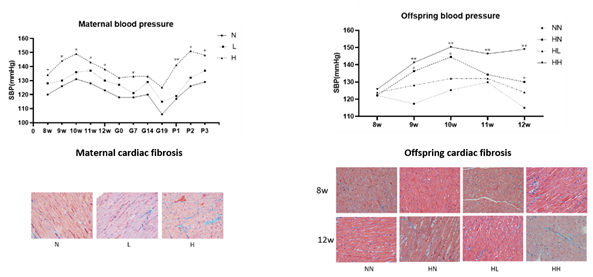Mothers-to-be who follow a high-salt diet put their children’s future health at risk
已发布 10 六月, 2022
High-salt diets are a major cause of death worldwide and can lead to cardiovascular diseases. As the daily salt intake in China remains high, a group of Chinese researchers used a rat model to explore the impact of a mother-to-be’s high-salt diet on their offspring. The team, from The Third Affiliated Hospital of Guangzhou Medical University in China, has now published its results in the KeAi journal Gynecology and Obstetrics Clinical Medicine.
The study indicates that maternal high-salt diets result in hypertension and cardiovascular conditions in the mother. In addition, they induce high blood pressure and increase the predisposition to hypertension in the offspring. These conditions are often accompanied by cardiac fibrosis; a thickening of the cardiac valves.
Commenting on the experiment, co-corresponding author Jingsi Chen explains: “We separated the pregnant female rats into three separate groups and fed each one a diet containing a different concentration of salt (high, normal and low). To explore the effects of a maternal high-salt diet on hypertension, we monitored the blood pressure and urine protein levels of both the mothers and their eventual offspring. We found that the blood pressure of the offspring with high salt exposure during pregnancy was higher than that of the offspring with normal salt exposure in the uterine, even if they were both fed a normal diet after weaning. This suggests that an intrauterine high salt environment already impacts the development of babies and continues to impact them as they transition into adulthood.”
To determine the influence of a high-salt diet on the offspring’s cardiac tissue, the team tested specific protein levels and found that a high salt environment could lead to cardiac fibrosis, which is associated with conditions such as hypertension and heart failure. The offspring also had an increased risk of developing high blood pressure in adulthood.
Chen adds: “This study shows that the harm of excessive salt intake is more profound than we thought. We should all keep our salt intake within the recommended guidelines, especially women during pregnancy.”
###
Contact the co-corresponding authors: Jingsi Chen, ceasawchen@gzhmu.edu.cn | Dunjin Chen, gzdrchen@gzhmu.edu.cn

Image: Reseachers found that high-salt exposure increased the blood pressure of mothers-to-be and their offspring, resulting in heart damage. CREDIT: The Third Affiliated Hospital of Guangzhou Medical University.